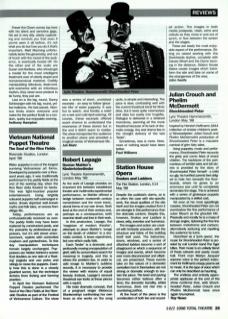As the work of Lepage provides an important link between established theatre and multimedia experimental performance, so Mahler offered a bridge between nineteenth century romanticism and the more ironic, atonal forms of our own times. Both lived at the end of their century and, perhaps as a consequence, both examine death and loss in their work.
In this production, Lepage, the 'magician of modern theatre', attempts to place Mahler's 'songs on the death of children' in a dramatic context. A brave experiment, but one which sadly fails.
Each ‘lieder' is a dramatic and profoundly moving encapsulation of grief, with its concomitant search for meaning in tragedy, and this is where the problem lies. In order to add image to Mahler's sublime sounds, it is necessary to provide the viewer with visions of equal beauty. Instead, Lepage's sensual theatrical eye looks at these pieces with a squint.
His main dramatic concept, that of a pregnant singer (Rebecca Blankenship) confronting her own fears as she works on the song cycle, is simple and interesting. The pace is slow, contrasting well with the current theatrical trend for filmic drive, but it never quite mesmerises and slips too easily into turgidity. Dialogue is delivered in a strained monotone, seeming all the more theatrical because of its lack of dramatic energy. Any real drama lies in the straight delivery of the last ‘lieder'.
Sometimes, less is more. Here, more or nothing would have been better.

